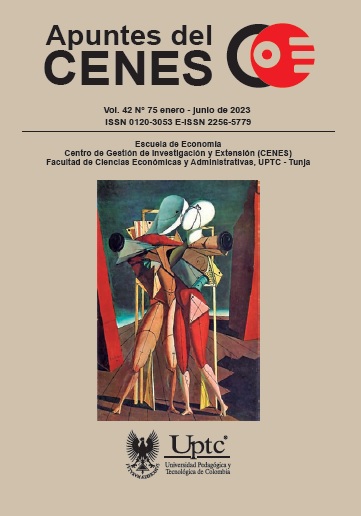Fintech and the Economic Crisis Caused by COVID-19

Abstract
This paper aims to analyze the opportunities of fintech in the face of the economic crisis generated by COVID-19, which has had a great impact on companies and on the lives of people who have been forced to reinvent their work, consumption habits and their interaction with the environment in order to sustain themselves in an increasingly competitive market that affect their lifestyle. It is essential to bear in mind that the traditional system and the government have made efforts to maintain the country's economic stability, but the results have not been very satisfactory. Therefore, a triangular-type exploratory research is carried out from the qualitative and quantitative aspects, through the application of information collection instruments, identifying financial, organizational and strategic of the SMEs in the city of Bogotá, that reported their financial statements with cutoff to December 2021 to the Superintendency of Corporations. Finally, it is evident the opportunity for fintech to do disruptive technological innovation for the development of financial products through connectivity from mobile devices for personal use that allow monitoring, electronic commerce, transaction systems, financing, decision-making models and optimization of financial processes at a low cost, which makes it possible to open a range of multiple opportunities for SMEs that seek greater participation and competitiveness where they can offer their products and services in an efficient, agile, comfortable and reliable way.
Keywords
financial market, innovation, technology, financial management, economic crisis, electronic commerce, financing, government, small business
References
- Alliance for Financial Inclusión (AFI). (2018). Fintech for Financial Inclusion: A Framework for Digital Financial Transformation. Afi-Global. https://www.afi-global.org/wp-content/uploads/publications/2018-09/AFI_FinTech_Special%20Report_AW_digital.pdf
- Allen, F., Demirguc-Kunt, A., Klapper, L. & Martínez Peria. (2016). The Foundations of Financial Inclusion: Understanding Ownership and Use of Formal Accounts. Journal of Financial Intermediation, 27, 1-30. https://doi.org/10.1016/j.jfi.2015.12.003 DOI: https://doi.org/10.1016/j.jfi.2015.12.003
- Ambriz, S., Dauahare, G. & Ángeles, M. (2017). Tesis y otras modalidades de titulación: estrategias metodológicas. Facultad de Estudios Superiores Cuautitlán.
- ANIF. (2020, oct.). Gran Encuesta Pyme. ANIF. https://www.anif.com.co/encuesta-mipyme-de-anif/gran-encuesta-pyme-nacional/
- Banco Interamericano de Desarrollo. (2018). Fintech: América Latina 2018: crecimiento y consolidación. http://doi.org/10.18235/0001377.
- Barrera Rodríguez, A. & Narváez Martínez, L. (2020). FinTech como fuente de financiación alternativa en Colombia e India. Repositorio UCC. https://repository.ucc.edu.co/bitstream/20.500.12494/33394/4/2020_fintech_fuente_financiaci%C3%B3n.pdf
- Beltrán, A., Torres, E., Camargo, R. & Bello, C. (2004). Pymes, un reto a la competitividad. Universidad Externado de Colombia.
- Bryan, M. (2020, 7 de dic.). Las razones por las que el crédito digital llegará a más colombianos. Banca de las Oportunidades. https://www.bancadelasoportunidades.gov.co/es/blogs/blog-de-bdo/las-razones-por-las-que-el-credito-digital-llegara-mas-colombianos
- Cámara de Comercio de Bogotá. (2019). Open Data. Open Data Bogotá. https://opendatabogota.ccb.org.co/
- Cañas Brito, C. & Castro, B. (2019). Modelos de negocio fintech y su aplicación a la generación de valor de las pymes del sector de la construcción. Repositorio EAFIT. https://repository.eafit.edu.co/bitstream/handle/10784/13515/Trabajo%20de%20Grado%20Bianey%20Castro%20-%20Carlos%20Alberto%20Britto.pdf?sequence=2&isAllowed=y
- Carballo, I. E. (2020). Tecnologías financieras: oportunidades y desafíos de las fintech para la regulación, la educación y la inclusión. Revista CIES, 11(2), 247-276.
- Clavijo, S. & Vera, A. (2018, oct.). Desaceleración económica: agenda investigativa 2017. La República. https://www.larepublica.co/analisis/sergio-clavijo-500041/desacerleracion-economica-agenda-investigativa-de-2017-2589705
- Colombia Fintech. (2021, 20 de jun.). Ventajas que ofrecen los pagos digitales para los emprendimientos. Colombia Fintech. https://colombiafintech.co/lineaDeTiempo/articulo/5-ventajas-que-ofrecen-los-pagos-digitales-para-los-emprendimientos
- Cull, R., Ehrbeck, T. & Holle, N. (2014). Financial Inclusion and Development: Recent Impact Evidence. CGAP. https://www.cgap.org/sites/default/files/FocusNote-Financial-Inclusion-and-Development-April-2014.pdf
- DANE. (2020, 28 de mayo). Boletín Encuesta Emicron. DANE. https://www.dane.gov.co/files/investigaciones/boletines/ech/micro/bol-micronegocios-2019.pdf
- Deloitte. (2022, 24 de oct.). Fintech, la revolución tecnológica en la industria financiera. Deloitte. https://www2.deloitte.com/es/es/pages/financial-services/articles/fintech-la-revolucion-en-finanzas.html
- Demirguc-Kunt, A., Klapper, L. & Singer, D. (2017). Financial Inclusion and Inclusive Growth. A Review of Recent Empirical Evidence. World Bank. http://documents.worldbank.org/curated/en/403611493134249446/Financial-inclusion-andinclusive-growth-a-review-of-recent-empirical-evidence DOI: https://doi.org/10.1596/1813-9450-8040
- EY. (2019). Global Fintech Adoption Index. EY. https://www.ey.com/es_co/ey-global-fintech-adoption-index
- Falguni, D. (2015). The Evolution of Fintech. Forbes. https://www.forbes.com/sites/falgunidesai/2015/12/13/the-evolution-of-fintech/#17e3cc1c7175
- Finch Capital. (2020). The Future of Disruptive and Enabling Financial Technology post CV-19. https://www.slideshare.net/finchcapital/the-future-of-disruptive-and-enabling-financial-technology-post-cv19
- García Aguilar, J., Galarza Torres, S. P. & Altamirano Salazar, A. (2017). Importancia de la administración eficiente del capital de trabajo en las Pymes. Revista Ciencia UNEMI, 10(23), 10. file:///C:/Users/estudiantes/Downloads/Dialnet-ImportanciaDeLaAdministracionEficienteDelCapitalDe-6151264.pdf DOI: https://doi.org/10.29076/issn.2528-7737vol10iss23.2017pp30-39p
- Gomber, P. K. (2018). On the Fintech Revolution: Interpreting the Forces of Innovation, Disruption, and Transformation in Financial Services. Journal of Management Information Systems. https://www.semanticscholar.org/paper/On-the-Fintech-Revolution%3A-Interpreting-the-Forces-Gomber-Kauffman/bac6897ab7d756aa067c564bd9aabd19e2d8fcf8
- Hernández, R., Fernández, C., & Baptista, M. (2010). Metodología de la investigación. McGraw-Hill-Interamericana Editores.
- Irimia Diéguez, A. (2018). El desarrollo de los servicios fintech como oportunidad para la empresa andaluza. FPV.
- Ketterer, J. (2017). Fintech, innovaciones en América Latina y Caribe. BID, Finnovista. https://publications.iadb.org/publications/spanish/document/FINTECH-Innovaciones-que-no-sab%C3%ADas-que-eran-de-Am%C3%A9rica-Latina-y-Caribe.pdf
- McKinsey. (2016). FinTechnicolor The New Picture in Finance. https://www.mckinsey.com/~/media/mckinsey/industries/financial%20services/our%20insights/bracing%20for%20seven%20critical%20changes%20as%20fintech%20matures/fintechnicolor-the-new-picture-in-finance.ashx
- McMillan, J. (2018). El fin de la banca. El dinero, el crédito y la revolución digital. Taurus- Penguin Random House.
- Morales Castro, J., Abreu Beristain, M. & Rosado Muñoz, L. (2012). El capital de trabajo de las empresas que cotizan en la bolsa mexicana de valores. UNAM. http://www.economia.unam.mx/publicaciones/econinforma/376/02joseantonio.pdf
- Orueta, I. E. et al. (2017). La financiación de las micro, pequeñas y medianas empresas a través de los mercados de capitales en Iberoamérica. Instituto Iberoamericano de Mercados de valores. https://www.iimv.org/iimv-wp-1-0/resources/uploads/2017/03/estudiocompleto.pdf
- Rincón, E. (2021). Estudios demuestran que Colombia es el octavo país del mundo en adherencia fintech. Diario La República. https://www.larepublica.co/finanzas/estudios-demuestran-que-colombia-es-el-octavo-pais-del-mundo-en-adherencia-fintech-3244664
- Sahay, R., Von Allmen, E. U., Lahreche, A., Khera, P., Ogawa, S., Bazarbash, M., & Beaton, K. (2020, June). The Promise of Fintech: Financial Inclusion in the Post COVID-19 Era. In Monetary and Capital Markets Department, 87. IMF. https://www.imf.org/en/Publications/Departmental-Papers-Policy-Papers/Issues/2020/06/29/The-Promise-of-Fintech-Financial-Inclusion-in-the-Post-COVID-19-Era-48623
- Sánchez Ambriz, G. & Ángeles Dahuahare, M. (2017). Tesis y otras modalidades de titulación. Estrategias metodológicas. Vol. 1. Universidad Autónoma de México.
- Sánchez-Pi, N. (2020, 27 de marzo). Empresas que aplican tecnología serán más exitosas para afrontar la crisis por Covid-19. Linked in. https://www.linkedin.com/pulse/empresas-que-aplican-tecnolog%25C3%25ADa-ser%25C3%25A1n-m%25C3%25A1s-exitosas-para-sanchez-pi/?trackingId=w1JJ374nF9RevEigBS9xFA%3D%3D
- Vargas Rubio, P. (2020, 17 de abr.). La coyuntura actual tiene tres escenarios que deben ser analizados a la hora de reactivar los mercados en medio del Covid-19. La República, p. 4. https://www.larepublica.co/globoeconomia/como-reactivar-la-economia-en-medio-de-la-pandemia-durante-las-tres-etapas-de-la-crisis-2993415
